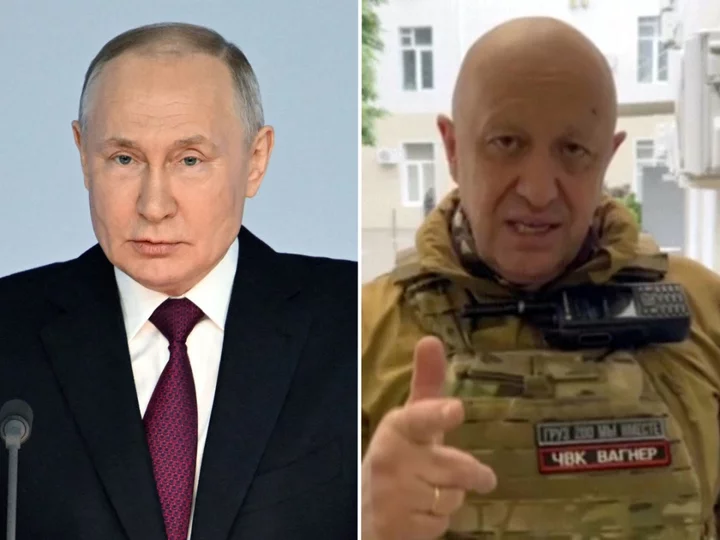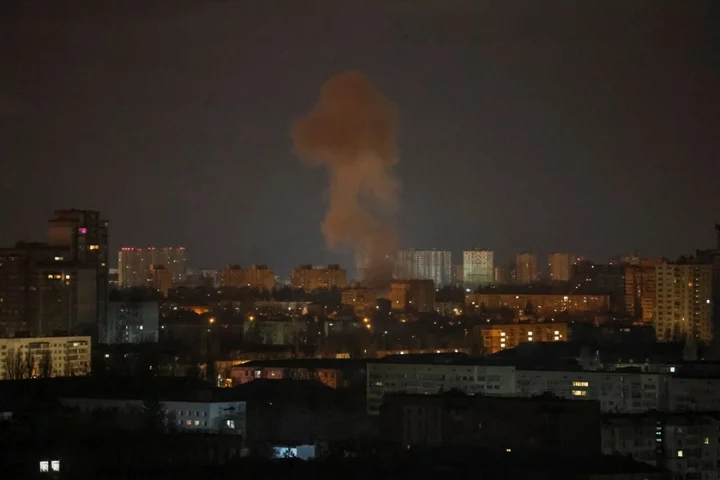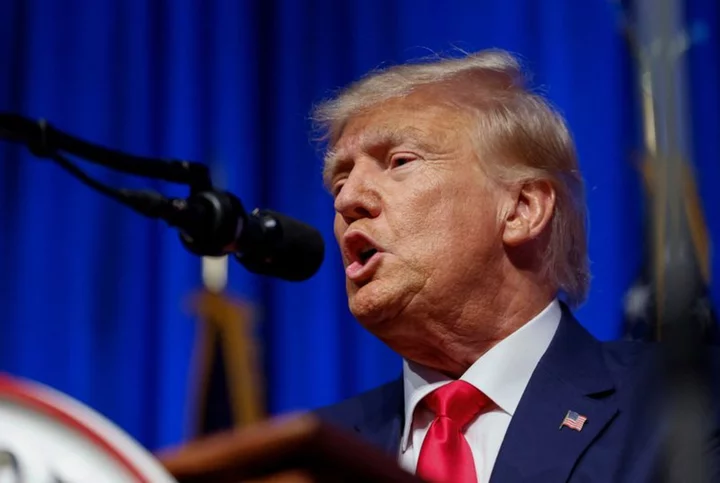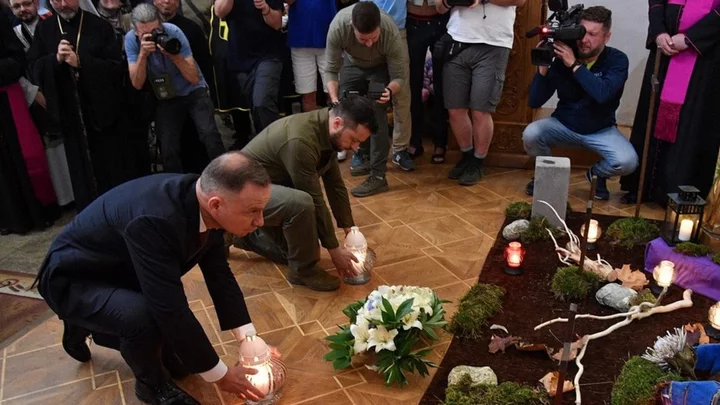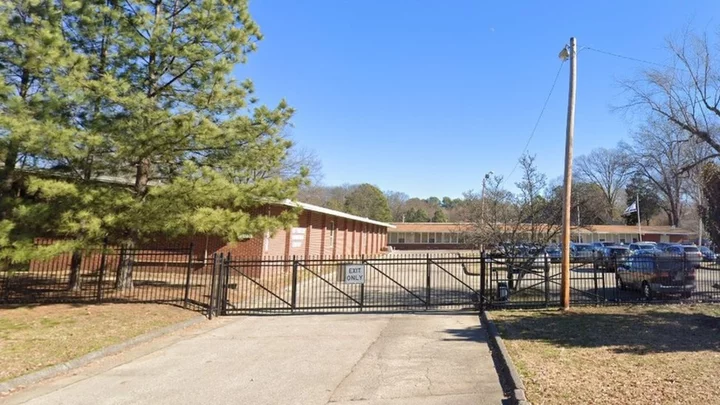Vladimir Putin has admitted that Russia's security services "stopped a civil war" during the mutiny led by Yevgeny Prigozhin and his Wagner mercenaries – whose wages and bonuses Moscow funded to the tune of £800m in the past year. His remarks came as the Belarusian President, Alexander Lukashenko, confirmed that the Wagner chief had arrived in his country as part of the last-minute deal that ended the extraordinary attempted coup. Mr Lukashenko said that Mr Progozhin and some of his troops were welcome to stay "for some time" at their own expense. Mr Putin appeared outside the Kremlin the praise his troops, seeking to portray the image of strength that Saturday's events had left a severe crack in. Speaking in front of hundreds of troop, Mr Putin said said the country's armed forces had prove their "loyalty to the people of Russia" in protecting the "motherland and its future". The Russian leader claimed that Moscow had not been forced to withdraw troops from Ukraine and he held a minute’s silence in honour of the servicemen killed when Wagner forces shot down Russian military aircraft, including helicopters and a communications plane, as they marched on Moscow. The mercenaries stopped about 125 miles outside the capital. Mr Putin was joined by the defence minister, Sergei Shoigu, whose dismissal had been one of Mr Prigozhin's main demands – having feuded with Russia's military leadership for months. While Russian authorities dropped a criminal case against his Wagner Group – apparently fulfilling another condition of the deal brokered by Mr Lukashenko – Mr Putin appeared to set the stage for financial charges against an organisation owned by Mr Prigozhin. After his speech outside the Kremlin, Mr Putin told a military gathering that Mr Prigozhin's Concord Group earned 80 billion rubles (£733m) from a contract to provide the military with food, and that Wagner received more than 86 billion rubles (£790bn) between May 2022 and May 2023 for wages and additional items. That had come out of the Defence Ministry and state budgets. For years, the Kremlin denied any links to the Wagner group. "I hope that while doing so they didn't steal anything or stole not so much," Mr Putin said, adding that authorities would look closely at Concord's contract. Police who searched his St Petersburg office on Saturday said they found 4 billion rubles (£37m) in trucks outside, according to media reports confirmed by the Wagner boss. He said the money was intended to pay soldiers' families. Kremlin spokesman Dmitry Peskov would not disclose details about the Kremlin's deal with the Wagner chief – saying only that Mr Putin had provided Mr Prigozhiin with "certain guarantees," with the aim of avoiding a "worst-case scenario." Asked why the armed Wagner forces were allowed to get as close as they did Moscow without facing any serious resistance, National Guard chief Viktor Zolotov told reporters, "We concentrated our forces in one fist closer to Moscow. If we spread them thin, they would have come like a knife through butter." Mr Zolotov also said the National Guard lacks battle tanks and other heavy weapons and now would get them. Some Russian war bloggers have vented outrage about Mr Prigozhin and his troops not getting punished for killing Russian forces. The treatment stands in stark contrast to the harsh jail terms handed out to opposition activists in Russia who have criticised Russia's invasion of Ukraine. In Belarus, Mr Lukashenko said that he had convinced Mr Prigozhin to end the mutiny in an emotional, expletive-laden phone call, adding that Mr Prigozhin had arrived in the southern Russian city of Rostov – which Wagner seized to start the rebellion – in a "semi-mad state". Mr Lukashenko said he tried for hours by phone to reason with the Wagner chief, who has said he was furious at corruption and incompetence in the military leadership and wanted to avenge an alleged Russian army attack on his men. The Belarusian president said their calls contained "10 times" as many obscenities as normal language. Mr Lukashenko also said that, earlier on Saturday, Russian Mr Putin had sought his help, complaining that Prigozhin was not taking any calls. Lukashenko said he had advised Putin against "rushing" to crush the mutineers. Mr Lukashenko said that his country would accommodate Wagner fighters who wanted to go there, though it was not building any camps for them. "We offered them one of the abandoned military bases. Please - we have a fence, we have everything - put up your tents," Lukashenko said, according to state media. Such a prospect alarms Belarus's neighbours. Latvia and Lithuania both called for Nato to strengthen its eastern borders in response, and Polish President Andrzej Duda called the move a "negative signal". Ukraine is hoping to take advantage of the chaos caused by the attempted coup to push on with its counteroffensive to retake its territory from Russia. Mr Putin offering Wagner's troops the chance to sign contracts with the Russian army is said that was "likely in an effort to retain them" in the fight in Ukraine because Moscow needs "trained and effective manpower" as it faces a Ukrainian counteroffensive, the Institute for the Study of War, a US-based think tank that monitors the war said. In the US, the Pentagon said it would provide a new military package worth $500 million (£390m) to support Ukraine's war effort. The package will include ground vehicles including Bradley fighting vehicles and Stryker armored personnel carriers, and munitions for High Mobility Artillery Rocket Systems (Himars) to support air defences. Reuters and Associated Press contributed to this report Read More The Body in the Woods | An Independent TV Original Documentary The harrowing discovery at centre of The Independent’s new documentary Wagner chief walks free after armed revolt. Other Russians defying the Kremlin aren’t so lucky In China, muted reaction to revolt in Russai belies anxiety over war, global balance of power Who is Yevgeny Prigozhin?
Vladimir Putin has admitted that Russia's security services "stopped a civil war" during the mutiny led by Yevgeny Prigozhin and his Wagner mercenaries – whose wages and bonuses Moscow funded to the tune of £800m in the past year.
His remarks came as the Belarusian President, Alexander Lukashenko, confirmed that the Wagner chief had arrived in his country as part of the last-minute deal that ended the extraordinary attempted coup. Mr Lukashenko said that Mr Progozhin and some of his troops were welcome to stay "for some time" at their own expense.
Mr Putin appeared outside the Kremlin the praise his troops, seeking to portray the image of strength that Saturday's events had left a severe crack in. Speaking in front of hundreds of troop, Mr Putin said said the country's armed forces had prove their "loyalty to the people of Russia" in protecting the "motherland and its future". The Russian leader claimed that Moscow had not been forced to withdraw troops from Ukraine and he held a minute’s silence in honour of the servicemen killed when Wagner forces shot down Russian military aircraft, including helicopters and a communications plane, as they marched on Moscow. The mercenaries stopped about 125 miles outside the capital. Mr Putin was joined by the defence minister, Sergei Shoigu, whose dismissal had been one of Mr Prigozhin's main demands – having feuded with Russia's military leadership for months.
While Russian authorities dropped a criminal case against his Wagner Group – apparently fulfilling another condition of the deal brokered by Mr Lukashenko – Mr Putin appeared to set the stage for financial charges against an organisation owned by Mr Prigozhin. After his speech outside the Kremlin, Mr Putin told a military gathering that Mr Prigozhin's Concord Group earned 80 billion rubles (£733m) from a contract to provide the military with food, and that Wagner received more than 86 billion rubles (£790bn) between May 2022 and May 2023 for wages and additional items. That had come out of the Defence Ministry and state budgets. For years, the Kremlin denied any links to the Wagner group.
"I hope that while doing so they didn't steal anything or stole not so much," Mr Putin said, adding that authorities would look closely at Concord's contract. Police who searched his St Petersburg office on Saturday said they found 4 billion rubles (£37m) in trucks outside, according to media reports confirmed by the Wagner boss. He said the money was intended to pay soldiers' families.
Kremlin spokesman Dmitry Peskov would not disclose details about the Kremlin's deal with the Wagner chief – saying only that Mr Putin had provided Mr Prigozhiin with "certain guarantees," with the aim of avoiding a "worst-case scenario."
Asked why the armed Wagner forces were allowed to get as close as they did Moscow without facing any serious resistance, National Guard chief Viktor Zolotov told reporters, "We concentrated our forces in one fist closer to Moscow. If we spread them thin, they would have come like a knife through butter."
Mr Zolotov also said the National Guard lacks battle tanks and other heavy weapons and now would get them.
Some Russian war bloggers have vented outrage about Mr Prigozhin and his troops not getting punished for killing Russian forces. The treatment stands in stark contrast to the harsh jail terms handed out to opposition activists in Russia who have criticised Russia's invasion of Ukraine.
In Belarus, Mr Lukashenko said that he had convinced Mr Prigozhin to end the mutiny in an emotional, expletive-laden phone call, adding that Mr Prigozhin had arrived in the southern Russian city of Rostov – which Wagner seized to start the rebellion – in a "semi-mad state".
Mr Lukashenko said he tried for hours by phone to reason with the Wagner chief, who has said he was furious at corruption and incompetence in the military leadership and wanted to avenge an alleged Russian army attack on his men. The Belarusian president said their calls contained "10 times" as many obscenities as normal language. Mr Lukashenko also said that, earlier on Saturday, Russian Mr Putin had sought his help, complaining that Prigozhin was not taking any calls. Lukashenko said he had advised Putin against "rushing" to crush the mutineers.
Mr Lukashenko said that his country would accommodate Wagner fighters who wanted to go there, though it was not building any camps for them. "We offered them one of the abandoned military bases. Please - we have a fence, we have everything - put up your tents," Lukashenko said, according to state media.
Such a prospect alarms Belarus's neighbours. Latvia and Lithuania both called for Nato to strengthen its eastern borders in response, and Polish President Andrzej Duda called the move a "negative signal".
Ukraine is hoping to take advantage of the chaos caused by the attempted coup to push on with its counteroffensive to retake its territory from Russia. Mr Putin offering Wagner's troops the chance to sign contracts with the Russian army is said that was "likely in an effort to retain them" in the fight in Ukraine because Moscow needs "trained and effective manpower" as it faces a Ukrainian counteroffensive, the Institute for the Study of War, a US-based think tank that monitors the war said.
In the US, the Pentagon said it would provide a new military package worth $500 million (£390m) to support Ukraine's war effort. The package will include ground vehicles including Bradley fighting vehicles and Stryker armored personnel carriers, and munitions for High Mobility Artillery Rocket Systems (Himars) to support air defences.
Reuters and Associated Press contributed to this report
Read More
The Body in the Woods | An Independent TV Original Documentary
The harrowing discovery at centre of The Independent’s new documentary
Wagner chief walks free after armed revolt. Other Russians defying the Kremlin aren’t so lucky
In China, muted reaction to revolt in Russai belies anxiety over war, global balance of power
Who is Yevgeny Prigozhin?

